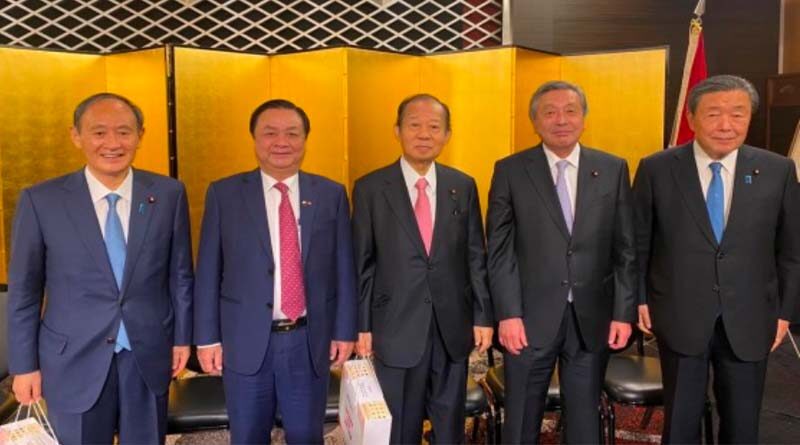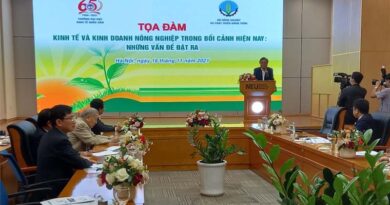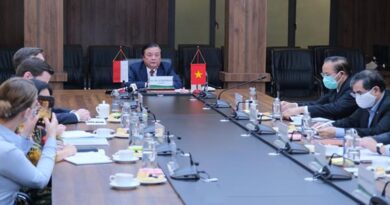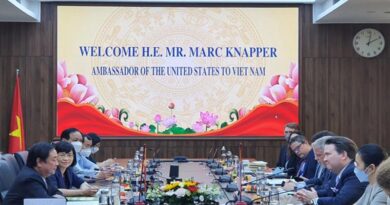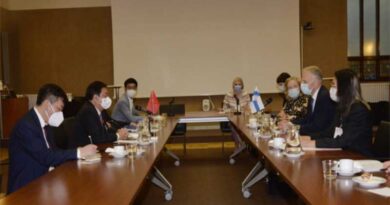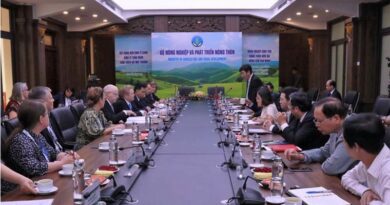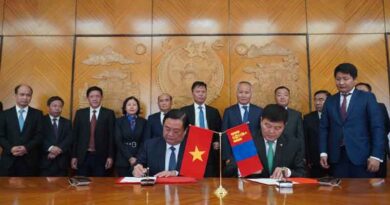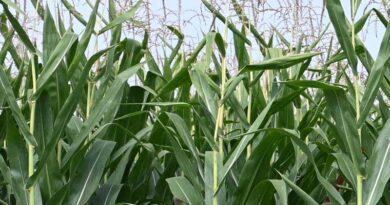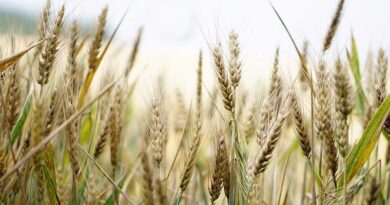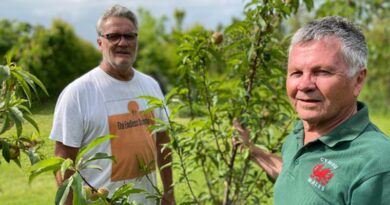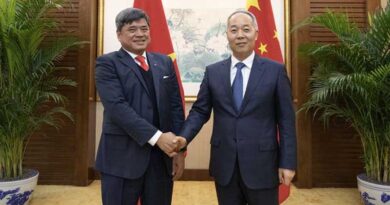Promoting cooperation in agriculture, forestry and fishery between Vietnam and Japan
25 November 2021, Vietnam: Within the framework of the official working trip to Japan of Prime Minister Pham Minh Chinh, on November 24, Mr. Le Minh Hoan, Minister of Agriculture and Rural Development (MARD) had bilateral working sessions with agencies and organizations of Japan to promote cooperation in agriculture, forestry and fishery between the two countries.
At the working session with Mr. Kaneko Genjiro – Japanese Minister of Agriculture, Forestry and Fisheries, Minister Le Minh Hoan shared about good relationship between the two ministries and the tradition of friendship built by the leaders of the two Governments from nearly 50 years ago (since 1973).
Since being an extensive strategic partner for peace and prosperity in Asia in 2014, the Governments of Vietnam and Japan in general, as well as the agriculture sector of the two countries in particular, have made many commitments to support each other.
In the medium and long-term vision of cooperation in agriculture, the two ministries have agreed to develop and implement through 2 phases: 2015-2019 and 2020-2024, with 4 signed Memorandum of Understanding (MOU), including: MOU to cooperate in the dissemination of standards and certifications related to the quality of agricultural products and food (signed on April 24, 2018); MOU on rice value chain development (signed on October 12, 2018); MOU on exchange of technology and techniques in irrigation; MOU on fisheries cooperation (signed on 12/12/2020). This is the legal framework for MARD of Vietnam and the Ministry of Agriculture, Forestry and Fisheries of Japan to carry out a lot of cooperation activities over the past time, contributing to promoting trade between the two countries.
The two ministers also agreed to make joint efforts to promote trade in agriculture, forestry and fishery between the two countries. Minister Le Minh Hoan informed about opening of the market for Japanese Uysu tangerines entering Vietnam from October 2021. On that basis, Minister Le Minh Hoan suggested that Minister Kanedo direct specialized agencies of the Japanese side to quickly complete procedures to open fresh Vietnamese longans to Japan in the 2022 harvest, applying online inspection or facilitate expedited procedures for enterprises exporting heat-treated poultry to Japan. The two ministers also agreed to promote the opening of the market for Vietnamese pomelos and Japanese grapes as soon as possible.
According to Minister Le Minh Hoan, Vietnam is promoting the development of the agricultural sector in the direction of transparency, accountability, sustainability, integration of multi-values, in order to make an important contribution to ensuring food security, creating jobs and income for 63% of the population living in rural areas and 33% of the labor force. Minister Le Minh Hoan called for companionship and support from the Japanese Government, and directly from the Japanese Ministry of Agriculture, Forestry and Fisheries. Agriculture of the two countries has many similar starting points such as wet rice civilization, most of the population is engaged in agriculture or the characteristics of land are fragmented. Vietnam can learn a lot from Japan in cooperative economic development, community spirit, OCOP product development (one village, one product), high technology application, brand building, etc.
On this occasion, the two Ministers agreed to strongly promote cooperation between the two ministries in the coming time, including: (1) Effectively implementing medium and long-term agricultural cooperation in the period of 2020-2024; (2) Continue to promote the implementation of the contents of the signed MOU agreements; (3) Cooperation in academic exchange; science and technology among institutions; (4) Support and promote agricultural, forestry and fishery cooperation between localities; (5) Facilitating and promoting the connection of businesses in agriculture between the two countries.
Strengthen response, reduce disaster damage
On the same day, Minister Le Minh Hoan met with the Japanese Minister of Land, Infrastructure, Transport and Tourism, Mr. Saito Tetsuo. The leader of Vietnam’s agriculture said that in the medium and long-term vision of agricultural cooperation between the two countries in the period of 2020-2024, cooperation in disaster prevention, construction and completion of irrigation infrastructure and water resource management are major and prioritized contents.
“Vietnam is a country heavily affected by climate change and sea level rise, especially in the Mekong Delta, a key agricultural production area of Vietnam. This region is facing serious challenges due to the influence of subsidence, landslides, flooding, saline intrusion, floods and changes in the flow of the Mekong River,” said Minister Le Minh Hoan.
In response to natural disasters and climate change, Vietnam’s agricultural sector has implemented a series of solutions. Specifically, Vietnam adapts to climate change in the direction of respecting natural laws, transforming adaptive development models and exploiting opportunities from climate change. In addition, Vietnam continues to invest in infrastructure and equipment to ensure its warning, forecasting, and disaster resilience capabilities.
The multi-purpose, multi-functional irrigation system serving rice cultivation, aquatic products, upland crops and perennial crops is also a measure that Vietnam focuses on. The system of irrigation works is designed not only for production, but also responsible for water drainage, flood prevention, and ecological environment improvement.
In parallel with irrigation, Vietnam also implements measures to mitigate greenhouse gas emissions through the application of management and technology in cultivation and animal husbandry; improve animal diets; structure transformation of plant varieties; change the land use method; technology for treatment and reuse of by-products and wastes in agricultural and livestock production; develop organic agriculture. GHG emission and sequestration mitigation measures are also present in the management of forest land, cropland, grassland, wetland and other land types and development of agroforestry models to improve carbon stocks, conserve soil.
The above efforts and commitments were demonstrated by Vietnam at the Leaders’ Summit within the framework of the 26th United Nations Conference on Climate Change (COP26). Vietnam’s goal is to reduce net emissions to zero by 2050.
In the visit, MARD’s delegation acknowledged the companionship of the Ministry of Land, Infrastructure, Transport & Tourism of Japan. The two ministries had a cooperation agreement signed in 2012 and 2020.
Many practical activities have been implemented by the two sides such as: the Japanese side sent 3 experts to work and provide technical support at the General Department of Natural Disaster Prevention and Control (MARD); coordinate in organizing 8 conferences; working groups of the two countries regularly exchange and learn from each other’s experiences; Many technical meetings between Japanese businesses introduced by the Japanese Ministry of Land, Infrastructure, Transport and Tourism have been connected with relevant agencies of the Ministry of Agriculture and Rural Development as well as localities.
Especially, after the historic storm Hagibis in 2019, Japan supported, introduced and exchanged experiences with the delegation of the Central Steering Committee for Natural Disaster Prevention and Control in Vietnam on prevention activities, response and remedial action at the scene of Japan.
Appreciating the cooperation and support of the Japanese Ministry of Land, Infrastructure, Transport and Tourism, the Ministry of Agriculture and Rural Development proposed the Japanese side continue to support 5 issues. These are: (1) Discussing towards signing a Memorandum of Understanding for the period of 2023-2026 in the field of disaster prevention; (2) Promote information exchange, experience sharing and cooperation on the following topics: flash floods; landslide; riverbank and coastal erosion; flood prevention in rivers; particularly large floods; urban flooding; (3) Support each other in multilateral forums such as ADRC, APEC, ASEAN, activities to implement the Sendai Framework; (4) Supporting bilateral activities such as: implementing JICA projects in Vietnam; sharing experiences, about the Operations Center; cooperation in emergency situations; new technology application; building and forming new cooperation projects; (5) Continue to support the implementation of the Projects “Strengthening capacity to respond to and reduce damage caused by flash floods and landslides in the Northern mountainous area” and “Technical cooperation for development planning on Flood Recovery and Development of a Master Plan on Disaster Prevention and Control in Central Vietnam”.
Upgrading the OCOP Program
Besides working sessions with Japanese state management agencies, the Minister of MARD also worked with JICA Vice President, Mr. Shinichi Yamanaka. This is the second time he has visited the organization, and expressed his impression of the spirit of “Omoiyari”.
Omoiyari is a combination of omou and yaru. Omou, meaning to think or feel, is used in many situations, from expressing opinions to remembering the deceased. Whereas yaru means to do, to give or to undertake. It is this verb that makes “omoiyari” a word of chivalry and sympathy, described in the book of the same name by Fukuzawa Yukichi, and inspired by Minister Le Minh Hoan to many cooperatives’ managers in Vietnam about the spirit, thinking in the construction of the country of the Japanese.
“I have some JICA friends since I was working in Dong Thap and have a deep impression of JICA and the Japanese people”, Minister Le Minh Hoan confided.
During the meeting with JICA leaders, Minister Le Minh Hoan recounted his memories of visiting Japanese cooperatives and visiting Oita province, where the movement “First village – First product” began. The minister emphasized, “I stood there and envisioned this village how to develop, build and promote the product. How did Japan become self-reliant and self-reliant? Since then, I have thought about how to further develop the OCOP program in Vietnam. In the period of 2021-2025, I hope to raise the level of the OCOP program more deeply”.
Minister Le Minh Hoan highly appreciated the help from Japan for the development of Vietnam’s agricultural industry. In the first cooperation period from 2015-2019, Vietnam has received and benefited 10 Japanese ODA projects, including 5 loan projects and 5 technical assistance projects, deployed in many sub-sectors, making an important contribution to the development of the industry. The Minister agreed with JICA on a serious review to speed up the progress of ongoing projects, and carefully set priorities for projects that are about to be proposed to JICA for support in the coming time.
On the occasion of the official visit of Prime Minister Pham Minh Chinh, Minister Le Minh Hoan introduced Vietnam’s OCOP products to Japanese leaders and businesses./.

